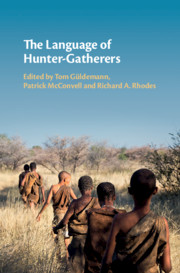Book contents
- The Language of Hunter-Gatherers
- The Language of Hunter-Gatherers
- Copyright page
- Dedication
- Contents
- Figures
- Maps
- Tables
- Contributors
- Preface
- Part I Introduction
- Part II Africa
- Part III Tropical Asia
- 7 Hunter-Gatherers in South and Southeast Asia: The Mlabri
- 8 Foraging and the History of Languages in the Malay Peninsula
- 9 Linguistic Clues to Andamanese Prehistory: Understanding the North-South Divide
- 10 Historical Linguistics and Philippine Hunter-Gatherers
- 11 Hunter-Gatherers of Borneo and Their Languages
- Part IV New Guinea and Australia
- Part V Northeastern Eurasia
- Part VI North America
- Part VII South America
- Appendix A Preliminary Worldwide Survey of Forager Languages
- Language Index
- Subject Index
- References
7 - Hunter-Gatherers in South and Southeast Asia: The Mlabri
from Part III - Tropical Asia
Published online by Cambridge University Press: 26 February 2020
- The Language of Hunter-Gatherers
- The Language of Hunter-Gatherers
- Copyright page
- Dedication
- Contents
- Figures
- Maps
- Tables
- Contributors
- Preface
- Part I Introduction
- Part II Africa
- Part III Tropical Asia
- 7 Hunter-Gatherers in South and Southeast Asia: The Mlabri
- 8 Foraging and the History of Languages in the Malay Peninsula
- 9 Linguistic Clues to Andamanese Prehistory: Understanding the North-South Divide
- 10 Historical Linguistics and Philippine Hunter-Gatherers
- 11 Hunter-Gatherers of Borneo and Their Languages
- Part IV New Guinea and Australia
- Part V Northeastern Eurasia
- Part VI North America
- Part VII South America
- Appendix A Preliminary Worldwide Survey of Forager Languages
- Language Index
- Subject Index
- References
Summary
The Indian subcontinent and mainland Southeast Asia are two vast expanses of land, which to a considerably extent are taken up by fertile valleys or lowlands. There have been sedentary groups of food producers for millennia over much of this area.
- Type
- Chapter
- Information
- The Language of Hunter-Gatherers , pp. 149 - 163Publisher: Cambridge University PressPrint publication year: 2020
References
- 1
- Cited by

